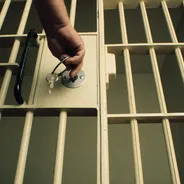Everybody loves a good unsolved murder, but in most instances, an open investigation will remain so because there are simply no available suspects. But in the case of one particular homicide, the problem was that there were too many suspects. Remember that episode of The Simpsons when Mr Burns gets shot? I always thought that the cliffhanger in that series was so compelling because it was a whodunit where every single cast member had a motive.
Little did I know that one of my favourite storylines was apparently based on an unbelievable real-life incident: a shooting in the sleepy little town of Skidmore, Missouri. It was here that, in a scene which resembled something from a spaghetti western, that a local man was shot in front of 46 witnesses, who promptly closed ranks and stayed silent when questioned about his death.
Ken Rex McElroy was the one guy in town who nobody liked, a man who was never invited to social occasions and whom neighbours would cross the street to avoid. Born in the midst of the Great Depression, the man's biography seemed synonymous with his lengthy criminal record.
McElroy the second youngest of sixteen children. His family were poverty-stricken farmers, who had migrated from Kansas to Missouri in search of work. McElroy dropped out of school at 15, and pursued a restless existence as a thief, poacher, rustler and womaniser. Over two decades, McElroy made it his mission to steal any provision from his neighbours that wasn't nailed down. Over 20 years, he purloined grain, gasoline, alcohol and livestock from other townspeople, and then intimidated witnesses with violent threats if they expressed a desire to testify against him. McElroy would stalk these potential witnesses for days, often parking outside their homes while watching them closely.
But aside from attempted assault and burglary, his other vice was an out-of-control libido, which ultimately led to him father more than 10 children with several different women. Trena McCloud first met McElroy when she was 12 years old, and became pregnant with his child at the age of fourteen. She ended up marrying and then living with him so he could avoid being charged with the statutory rape of a minor, to which she was the only witness. When Trena fled not long after the birth of their child, he tracked her down to her parents' house, shot the family dog, burned down the house, and took the terrified teenager back with him.
By 1981, there was almost nothing he hadn't been charged with, and his rap sheet showed multiple charges of assault, as well as child molestation, statutory rape, arson, hog and cattle rustling, and burglary. What's worse was that the more he got away with, the more daring he became. The late seventies saw a gradual escalation in the severity of his crimes. In 1976, farmer Romaine Henry claimed that McElroy shot at him with a shotgun, for which McElroy was charged with assault with intent to kill. McElroy denied everything, and the trial was continually postponed.
In 1980, things came to a bloody climax. The McElroy family started a feud with the Bowenkamps, after one of McElroy's children was caught shoplifting at patriarch "Bo" Bowenkamp's store. McElroy began threatening Bo, which culminated in him shooting Bowenkamp in the neck with a shotgun. Miraculously, Bo survived, and McElroy was arrested. He was originally charged with attempted murder, but eventually, this was lessened to assault, and then he was freed on bail. After release, McElroy began boasting that he was going to attack Bo again. In response to this, Nodaway County Sheriff Dan Estes suggested that concerned citizens form their own neighbourhood watch.
On the morning of July 10, the people of Skidmore met at the centre of town to discuss how they could best defend the Bowenkamps. During the meeting, McElroy and Trena were spotted heading into a local bar for a drink. Sheriff Estes then left the scene in order to patrol the outskirts of the town in his cruiser and afterwards, the neighbourhood watch promptly migrated to the bar where McElroy was drinking. Somewhat intimidated by the gang, McElroy finished his drinks and beat a hasty retreat. This is where things get hazy.
McElroy left the bar, proceeded to his pickup truck, and was promptly shot at several times. The shots rang out from the crowd that had followed him out. Two bullets from two different calibre rifles hit and killed him. Despite the 46 witnesses to the shooting, nobody in town ever came forward. Every witness other than Trena was either unable to name the assailant or claimed not to have seen who fired. McElroy was so loathed that the townspeople didn't even bother to call an ambulance for him. As a result, the district attorney's office decided to press charges, and a federal investigation led to nothing but dead ends. His murder remains unsolved.
McElroy's widow is the only person willing to pursue justice further and has since filed a wrongful death lawsuit against the Town of Skidmore, which was settled out of court by all parties for $17,600, with no admission of guilt from any of the defendants. Since then, the story of Skidmore's death has been adapted into a made-for-TV movie, and has been explored in the non-fiction book In Broad Daylight, by Harry MacLean. Yet despite this, McElroy's case is still open and there have been no new leads in over 30 years.
Could it be that McElroy's death is the last example of frontier vigilante justice? Did the town of Skidmore, tired of McElroy continually dodging an appropriate conviction, decide to take the law into its own hands? Even if it can't be proven, it seems likely. Today, Skidmore's population has dwindled to less than 300 inhabitants, and there have been other crimes since. And yet this murder is the one that nobody will talk about. Questions about the events of July 10 only provoke vague and shifting responses from those who were there and remember it. It seems that the inhabitants wish that the mystery, like Ken McElroy himself, would remain buried.












